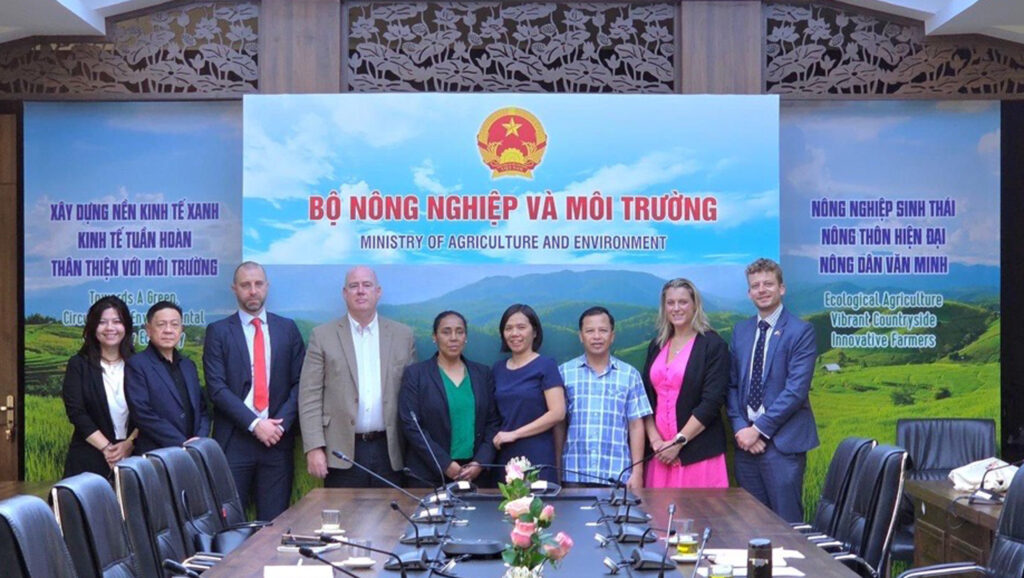Analysis: How UK agri-food attachés are expanding trade
 Trade missions to Asia have been organised to expand the reach of British pigmeat © AHDB
Trade missions to Asia have been organised to expand the reach of British pigmeat © AHDB With farmgate margins under pressure, expanding trade worldwide for UK food and drink has seldom been more important.
But navigating the complexities of various markets and government regulations remains challenging, which is where the UK’s 16 agri-food and drink attachés come in.
Their mission is to expand market access, remove barriers to trade, and promote export growth in key markets through on-the-ground engagement.
These attachés are stationed at British embassies and consulates worldwide, including in Canada, Mexico, the US, Brazil, Kenya, the Gulf region, India, Japan, China, Thailand and Vietnam.
See also: UK-EU deal to ease red tape on agricultural exports
Breaking into new markets
Maintaining access and breaking into new markets requires close attention to detail.
The NFU, which advocated for increasing the number of attachés from 11 to 16, emphasises that their role is crucial and should not be underestimated.
“We need the people on the ground to open those markets, and that should be the experts in food products, and that’s the value of the attachés,” says NFU president Tom Bradshaw.
“Without people on the ground, it’s going to be very difficult to break into those markets.”
Jonathan Eckley, the AHDB’s international trade development director, agrees.
“Having a really strong relationship from our government to the government of the competent authority in each market is important,” he says.
“One of the big roles the attachés play is trying to make sure there aren’t any barriers to trade and talking to government.”
In key markets such as Vietnam, government relationships are crucial, explains agri-food attaché Matthew Albion-Crouch, who covers Indonesia, Singapore and Vietnam.
“We have ministers coming to Vietnam, or senior officials like the UK chief veterinary officer, and we arrange meetings with Vietnamese ministers as well as market visits or visits to projects funded by the UK,” he says.
“They are vital because in countries like Vietnam, status is really important, and often things can only get done when the two leaders come together.
“That kind of diplomacy is a real core part of what we do, because quite often the barriers to trade aren’t just technical, they’re political as well.”
What value UK food exports?
UK exports of food, feed, and drink reached £24.6bn in 2024, reflecting a 0.5% rise from 2023 in current prices.
Yet, when accounting for trade price inflation, the real value of these exports fell by 2%.
Global demand for UK red meat exports is valued at £1.77bn a year, and the increasing demand for UK dairy in the EU and US has contributed to export values reaching £1.8bn in 2024.
Official trade figures for the first half of 2025 show that the value of total UK red meat exports, including offal, increased by nearly 10% year-on-year to £966m.
In 2024, pork export work added £49 a head for the sector.
Successes
Defra figures show that in 2023, the attachés supported the UK government in resolving 42 agri-food barriers worth an estimated £340m a year, with 141 new market access agreements delivered since 2020.
Other successes include securing market access for poultry to Tunisia, sheep embryos to the US, pork to Chile, trout ova to China, and pet food to South Korea.
In 2024, the food and drink sector had the highest share (16.8%) of reported market access barriers, followed by the financial and professional services sector (11.8%).
The network of agri-food and drink attachés, as former Defra farming minister Daniel Zeichner noted, works to remove those export barriers worldwide.
“Last year we resolved an export barrier nearly every week, including securing access to the US market for UK beetroot growers and resuming pork exports to China for major UK producers, which industry estimates are worth £80m,” Mr Zeichner told parliament in May.
In the first nine months of this year, 38 agri-food market barriers were resolved, building on the 65 barriers resolved in 2024.
Further successes include securing pork access to Mexico (worth an estimated £3.8m a year), and the removal of the cost-prohibitive dairy barrier with Egypt, which opens an opportunity worth up to £50m a year, according to industry estimates.
Opportunities
Vietnam, Indonesia and Singapore have been identified as markets of particular opportunity for UK exporters.
Mr Albion-Crouch explains that as well as smoothing out political issues, the role is often technical.
“If there are regulation changes or disease outbreaks, we need to go in and speak with our respective governments and try to ensure that there’s no knee-jerk reaction to make sure trade can continue,” he explains.
He adds that, although there are usually several barriers, the most significant one is the export health certificate.

A recent trade show in Miami © AHDB
“For most products of animal origin and some plant products, you need to negotiate an export health certificate with a country.
“So, at the moment, we can’t export beef or lamb to Vietnam because we haven’t gone through that process yet, although we’re looking to start that as soon as possible.”
A success in addition to securing access for pork and poultry, he said, was unlocking access for bovine semen to Indonesia.
“This obviously presents good opportunities for genetics producers in the UK to sell their products to importers in the Indonesian market,” he says.
He adds that Vietnam has also signalled that it is able to move forward with the UK’s application for beef and lamb access.
“It will open up a huge market for beef and lamb, providing access to 100m people,” he says.
Europe: Striving to restore a better balance of trade
A market that remains critical for British food and drink exports is Europe.
In value terms, 83% of the UK’s red meat (fresh, frozen and offal) and dairy products used to be exported to the EU annually.
According to Defra figures, the total value of food, feed and drink exports to the EU fell in 2024 compared with the previous year, down £600m to £24.6bn.
Meanwhile, imports increased significantly by £4bn to £64.1bn.
The first half of 2025 is looking better, with UK dairy exports to the EU reaching £830m—an increase of 17.8% compared with the previous year.
Similarly, UK red meat exports amounted to £770m, up 11.5% year on year.
Post-Brexit stress
Since the UK exited the EU, increased trade friction, such as extra paperwork and border checks, has turned a smooth operation into a burdensome, costly, and time-consuming process that mainly affects small exporters.
To help address these, Defra has two attachés on the Continent as part of a broader network working with Department for Business and Trade market access teams.
Together, they are tasked with addressing the frictions exporters currently face in doing business, and supporting work towards a common Sanitary and Phytosanitary (SPS) area, which is hoped will boost trade, slash costs and reduce paperwork at the border.
Henry Bellshaw is the UK agri-food and drink attaché based in Madrid, covering most of southern Europe as well as eastern Europe.
He works closely with UK government business and trade teams to share resources, identify trade barriers, and find export opportunities.
“Like all attachés, there is a big focus on market access – finding those barriers and resolving them,” he says.
“The other part is supporting negotiations on the SPS agreement with the EU – a major focus for this government.
“Exports dropped off 20% in many of the product categories post-Brexit, so there is a massive focus on trying to get that back up.”
The hope is that the SPS agreement, when it comes into effect, will eliminate the costs and red tape that currently deter people from exporting and make trade easier.
Internal legislation
Mr Bellshaw says that much of his work involves studying internal legislation in different EU member states, which could create new barriers.
“Rather than waiting for problems to come to us, we spend a lot of time looking at things member states are doing to make sure they won’t unfairly impact UK producers and exporters.”
Border inconsistencies are another key focus. “It differs from a trade barrier, which is systemic.
We see a lot of border inconsistencies where something gets stuck, the communication breaks down between the various parties, which is where we get involved.”
As for the market opportunities, Mr Bellshaw sees potential in most foodstuffs.
“There is particular interest in the high end, high quality that the UK offers, for example in cheese.
“When you order a cheese board, you may not expect to see a Red Leicester or a Stilton, but they are there in the tapas bars in Madrid,” he says.
